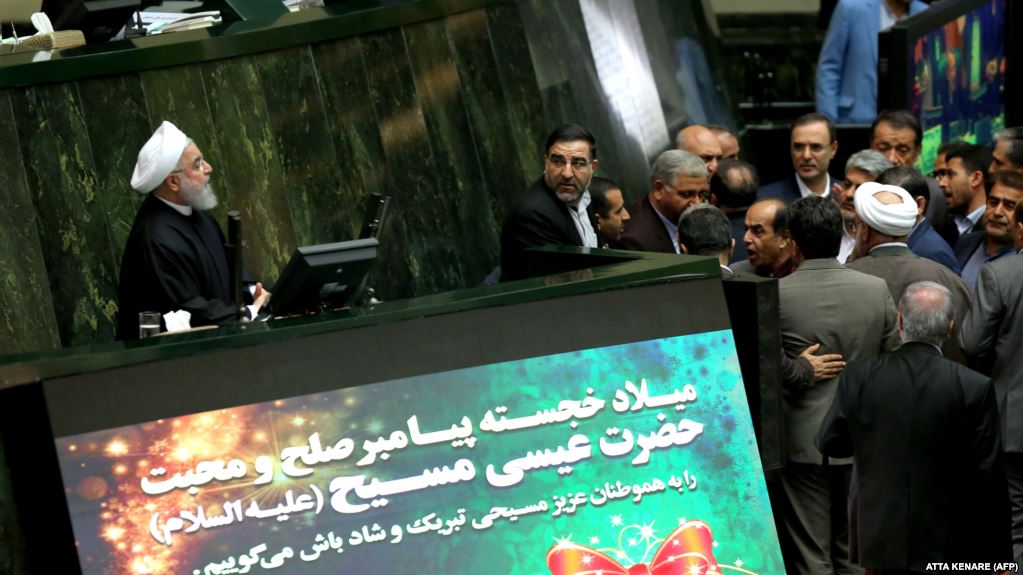Iran’s President Hassan Rouhani addresses Parliament, above a banner with good wishes for Christians, December 25, 2018 (Atta Kenare/AFP)
Iran’s President Hassan Rouhani has belatedly submitted the Government budget to Parliament but has said little about it, preferring to focus on US sanctions.
The budget was supposed to be presented on December 16, but was reportedly delayed by the intervention of the Supreme Leader.
Iran Daily, Dec 15: Has Supreme Leader Held Up Government Budget?
The budget increases spending by about 12% in the 2019-2020, despite a sharp restriction in oil revenues. The Government has reduced dependence on oil money to 27%, based on an estimate of $54 per barrel, but is risking a resurgence of inflation with deficit spending and an alteration of the rial-to-dollar exchange rate.
Amid Iran’s economic problems, fighting inflation had been a success for the Government, with a reduction from more than 40% in 2013 to less than 10%. However, with Iran’s currency losing 70% of its value against the US dollar this year and with oil exports halved, inflation has resurged to more than 35%.
The budget is about 4,700 trillion rials — $42.7 billion at the open-market rate of about 110,000:1 v. the US dollar; about $85.4 billion at the Government’s assumed rate of 55,000:1. Rouhani said it includes $14 billion for subsidies on basic goods, a $1 billion increase. Incomes for state employees and pensioners will rise by 20%.
In his speech to Parliament on Tuesday, Rouhani acknowledged that comprehensive US sanctions, imposed from November 5, “are not ineffective on people’s lives”, but maintained “the US will definitely fail in reaching that target”: “We will overcome problems with Parliament’s help, people’s support, and the Supreme Leader’s guidance.”
The additional American sanctions focus on the energy and financial sectors, although they have been limited for now by the granting of waivers to eight of Iran’s largest oil customers if they reduce imports.
Rouhani noted that if oil was not such a large revenue source for the State, Iran would be less vulnerable to the sanctions. He also emphasized that, to deal with corruption, the State must become more transparent.
But in a significant passage, he recognized protests across Iran that began last December and lasted for weeks, saying they spurred the Trump Administration’s economic pressure as well as its withdrawal from the 2015 agreement over Iran’s nuclear program:. He said of the demonstrations, which have continued in parts of the country:
In the beginning and end of last year’s Dey month [December 2017] we encountered some problems that made Americans think wrongly and take new stances against the Islamic Republic of Iran and the nuclear deal.
The main goal of the United States by these conspiracies, sanctions and pressures, which are directly aimed at the great Iranian nation [and] peoples of the region…is to bring the powerful Islamic Republic of Iran to its knees.”
He asked Iranian media and the public to refrain from comments such as references to hyper-inflation in which Iran will become like Venezuela: “Some friends echo enemies’ words in hard times, which will have dangerous effects on people and the system.”

